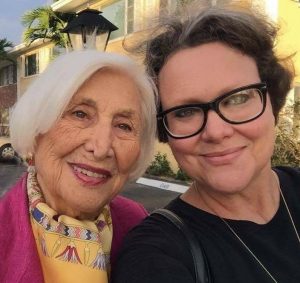I always thought of the Last Supper as a somber event because it is the last supper of Jesus before he was arrested, tried, and crucified. But what I overlooked was that what we honor as the Last Supper was also the celebration of Passover, which is not a somber event, but a cause for celebration, a time to remember and give thanks for God’s deliverance of the Jewish people after years of slavery.
I attended my first Passover Seder on Tuesday, thanks to the kindness of Jonathan and Susan Knopf, and the Synagogue of the Summit. The Seder was led by Rabbi Ruth Gelfarb and took place at the Senior Center. By my rough approximation, there were at least 150 people, families young and old, friends, and guests. It was anything but somber. As would be expected for an event remembering God’s deliverance of a people from slavery, it was a joyous event. And I am very grateful that I had the opportunity to experience it.
But it also got me thinking about another Passover dinner, two thousand years ago. What I have always thought of as a sad event, because Jesus knew what faced him, was by Jewish tradition a night of thanksgiving for God’s goodness. I tried to imagine what it must have been like at the final Passover feast for Jesus and his disciples.
Instead of breaking the unleavened bread to remember God’s provision during the Jews’ quick flight from Egypt, Jesus’ asked his disciples to accept this bread as his body, given up for them. And the wine they consumed would become the blood of the new sacrificial lamb of God. The blood that was shed for all of us.
Wondering about Jesus’ final Passover supper sent me to the Gospel of Saint John. In Chapters 13-17, I read how Jesus washed the feet of his disciples as an example of how we should serve others with love and humility. Afterward, as it finally dawned on the disciples that this would be the last night they would share with Jesus, he offers them consolation. In a soliloquy that is the longest passage of Jesus’ speaking in this gospel, he tells them over and over of how much he loves them, of his inseparability from God, and tells them that he will not leave them alone, but send the Holy Spirit to console them.
“I have loved you even as the Father has loved me. Live within my love. When you obey me you are living in my love, just as I obey my Father and live in his love. I have told you this so that you will be filled with my joy. Yes, your cup of joy will overflow! I demand that you love each other as much as I love you.” (St. John 15:9-11)
After attending my first Passover Seder, I am grateful for the Jewish heritage of my beliefs. I am grateful for the way in which God, in his wisdom and eye for beauty, wove together a tapestry of history and miracles that would link us forever in admiration and respect. Our Christian faith does not exist without the first covenant given to the Jewish people, or the Christ child born to a Jewish couple.
From today, I will view the Last Supper as a very special Passover feast. A second Passover, in which God once again redeemed, freed, and delivered us. Not from a physical slavery, but from a slavery to the sin which separated us from God. Jesus became the Paschal lamb who took away the sins of the world, his death became that holy sacrifice of the unblemished lamb. Therefore, Holy Thursday and Good Friday are solemn: When we see the altar stripped, and sit in that unholy silence of a world in which Jesus is dead, we feel a desperate longing for him.
When Jesus Christ rose from the dead, on Easter morning, he fulfilled the Old Testament requirements of a prophesied Messiah. Not one who came to rule a nation, but one befitting of the Son of God, who came to save the world.
I am sometimes asked how I can believe that Jesus Christ is the Son of God and that this is my chosen religion among so many others. It is because I see in Jesus someone who taught us to be our best selves. He taught us to love God, to love one another, to serve rather than to be served. Yes, I believe it all. His birth to the Virgin Mary, his miracles, his crucifixion and resurrection. I believe he is the Son of God, one part of the Holy Trinity. But what compels my love for him is his goodness, his love for each of us, no matter how undeserving we are, his love endures.
I am grateful for the Jewish heritage of my beliefs and the opportunity to participate in my first Passover Seder. I am grateful for another Easter to celebrate the resurrection of Jesus Christ, our Savior.

